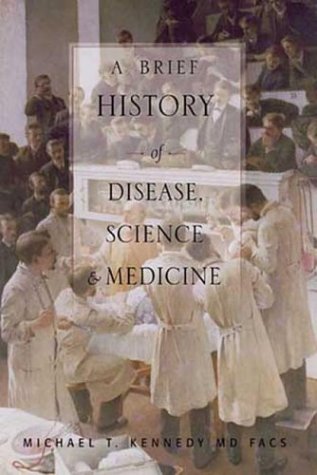

 |

|

The average rating for Brief History of Disease, Science and Medicine From the Ice Age to the Genome Project based on 2 reviews is 4.5 stars.
Review # 1 was written on 2019-08-11 00:00:00 Aaron Urquidez Aaron UrquidezSplendid piece of work, authoritative and readable Brief this is not, but compared to some dry academic tomes it seems brief. University of Southern California professor Dr. Michael T. Kennedy has the all too rare gift of writing well which he combines with a passion for detail so that this history is packed with the bizarre, the fascinating, the arcane, and the all too often revolting facts of medical delusion, malpractice, and triumph that have characterized the long and tortured history of the healing arts. Note well that this is a history not only of medicine and disease, but of science as well. The emphasis is on twentieth century developments, which is as it should be since so much has happened in recent times. This is not to say that the more distant past is neglected. Kennedy starts with the pre-history and follows the quest for health through Greek and Roman times to "The Rise of Islam and Arabic Medicine" (Chapter 5) with excursions into ayurvedic medicine (from India) and the traditional Chinese practices from antiquity. He even looks at European health, or the lack thereof, during the Dark and Middle Ages before the rise of science. When he gets to the modern or nearly modern era, Kennedy organizes less by chronology and more by subject matter. Some of the later chapters are about "Cardiac Surgery," "Transplantation," "Psychiatry," etc. I particularly liked the crisp way he dealt with psychoanalytic theory and the inefficacy of psychoanalysis. Frankly, I don't know if there is anything else quite like this available. The recognized authority on the subject of the history of medicine in English, University College London's late Roy Porter wrote both a popular account, Blood and Guts: A Short History of Medicine (2002), and a full blown treatment, The Greatest Benefit to Mankind (1997) which Kennedy cites. I have read the former and it is to Kennedy's book as Mary Poppins is to Hamlet. There are other histories, but most are either not current or too voluminous or too restricted in content. Dr. Kennedy shows how various ideas and methods were developed, how they stemmed from, or were in contrast to, earlier methods; and he highlights the personalities of the practitioners as he describes what they did or discovered. He also focuses on patients and their stories. His style is sharp and uncluttered. Sometimes he employs a dry, cynical wit. At other times his report takes on extra-medical aspects that lend depth and familiarity to his portraits, as when, for example, he reports on the tragic death of transplant pioneer, Dr. David Hume. (p. 388) Here are some examples of the kind of detail that I found fascinating: "The early Middle Ages saw little consumption of animal protein by the peasants, but legume production, which increased with the agricultural revolution, reduced the dependence on carbohydrates and led to rapid population growth again." (p. 69) And on the following page: "Women lived shorter lives than men in the Middle Ages...This is attributed to the hazards of childbirth, but also to an iron deficient diet...[because] animal protein was not available." "...[A]lthough opium offered some relief of pain...until the anesthesia era, speed was the sign of the good surgeon." (p. 85) "Infectious diseases were uncommon in primitive societies because the available pool of susceptible individuals was too small and the contact with other groups was not common." (p. 87) Indeed, infectious disease is part of the price we pay for agriculture and civilization. Quoting Freud: "I often console myself with the idea that, even though we achieve so little therapeutically, at least we understand why more cannot be achieved." (p. 401) This is doubly ironic since Freud was even deceived in what he thought he understood. A few pages later Kennedy drily remarks that psychotherapy "is useful in helping adults to deal with life stress. It has little or no role in treating psychosis. The serious mental illnesses are increasingly seen as biological disorders." (p. 424) The only weakness of this book is that it could have used a more meticulous editor. (The proofreading is excellent.) Kennedy's writing style is fast-forward, actually suggesting to me how medical history might be written had somebody like, say, novelist James M. Cain taken his hand to it. The words just rush down the page. Kennedy has so much to say and he wants to get it all said. Sometimes one has to read a sentence twice since sometimes his tenses are a little eccentric, and parallel construction is not always strictly observed. There are two indices, one for names, but I notice that the aforementioned Roy Porter, for example, does not appear in either of them. Probably the names in the footnotes were left out. Also the references (545 of them) are collected at the end of each chapter, which is fine, but there is no overall alphabetized bibliography. This is a pet peeve of mine since one has to chase through chapter after chapter to see if a particular work is cited. However Kennedy more than makes up for this deficiency with what he calls a "Postscript" which is a lightly annotated bibliography organized into the categories, "Recommended Reading," "General Sources," and sources by individual chapters. Bottom line: the best history of medicine that I have found and a delight to read. --Dennis Littrell, author of “The World Is Not as We Think It Is” |
Review # 2 was written on 2021-04-24 00:00:00 Brian Maxwell Brian Maxwellthe book may be "brief" but, it is very dense with content. Well written, but, be warned, some subject matter knowledge is needed in order to read and understand this book. Very informative and worth the time to read. |
CAN'T FIND WHAT YOU'RE LOOKING FOR? CLICK HERE!!!